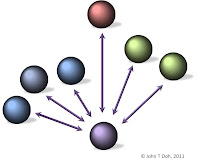I firmly believe in the benefits of having mentors and have
tried to build relationships with one of two, from each phase of my
career (i.e. leaders from various former roles and professors from my MBA).
Why find mentors:
A mentor is someone who is an experienced individual who is
able to provide guidance based on their wealth of experience. They’re able to help
you avoid potential pitfalls by providing a “been there, done that and this is
what I’ve learned” perspective.One other benefit of mentors is that they’re likely to be well connected (i.e. their friends/colleagues are in positions of power), which is useful for a large number of reasons.
How to get a mentor:
The approach I’ve taken to gaining mentors is simply to ask
if they’d like to catch up in person or over the phone, to discuss career
development or creative problem solving. I make sure to book meetings or calls
with them at a frequency that is determined by their seniority. If I have a
mentor that is only a few rungs higher than me in business, then I might catch
up with them monthly, whereas someone who is a leader in industry, I might only
catch up with them briefly, once every three months.
If you’ve read my post on the right way to network, you’ll know
to make sure that the relationship provides value for both parties. If a mentor
offers you advice, be sure to consider it and if it’s appropriate, act on it.
In my experience, mentors like to know that they’re being listened to and that
they aren’t wasting their time.
I have noticed that the best mentors often had excellent
mentors themselves when they first built their businesses or made progress in their
careers. Many senior leaders, provided the time commitment is small, would love
to take someone under their wing to "pay forward" the support they received when
they were just starting out.


No comments:
Post a Comment